Leadership is more than just making decisions or driving results in the business landscape. It is about leading with integrity and setting the standard for ethical practices. Ethical leadership fosters trust and a positive work environment, becoming the backbone of a successful organisational culture. Developing these skills requires intentional effort and training, such as the ILM Level 5 Course, which provides leaders with the tools to navigate complex challenges while upholding ethical principles.
This blog explores how ethical leadership influences an organisation's values and overall success, paving the way for sustainable growth and long-term success.
Table of Contents
- Understanding Ethical Leadership
- How Ethical Leadership Transforms Organisational Culture
- Conclusion
Understanding Ethical Leadership
Leading by example and emphasising integrity, equity, and responsibility in all choices and actions is known as ethical leadership. Strong ethical leaders set an example for their teams by exhibiting that honesty is not optional. They strongly emphasise doing morally even in the face of difficulty or hardship.
This leadership approach fosters a culture where moral conduct is accepted as the standard, going beyond individual integrity. By serving as role models, leaders give their team members the confidence to make moral decisions independently. As businesses traverse a world that is ever more complicated and competitive, moral leadership emerges as a critical component of sustained success.
How Ethical Leadership Transforms Organisational Culture
Ethical leadership creates a positive and inclusive workplace by shaping values and driving accountability. Below are the key ways ethical leadership profoundly impacts organisational culture:
1. Shaping Organisational Values and Norms
The ability to establish the standards and values of an organisation is important to ethical leadership. Leaders who value honesty, equity, and responsibility create a framework that affects how team members act and communicate. This foundation guarantees that moral behaviour becomes ingrained in the organisation's identity rather than merely being a set of rules.
When leaders exhibit them regularly, employees readily conform to ethical norms, creating an environment where doing the right thing comes naturally. By encouraging a feeling of purpose and shared accountability, this alignment aids in developing a cohesive culture where choices and behaviours are consistent with the organisation's basic values.
2. Building Trust and Transparency
An organisation's trust is its glue; moral leaders are essential to fostering that trust. Leaders foster an atmosphere where employees feel secure and appreciated by acting with integrity, dependability, and consistency. Open communication is promoted by decision-making transparency, which enables team members to comprehend the reasoning behind important decisions.
Employee relationships are strengthened, and trust is reinforced, for instance, when leaders publicly address difficulties or errors. This transparent culture encourages cooperation and loyalty, ensuring that groups work together to achieve shared objectives.
3. Enhancing Employee Engagement and Morale
Employee engagement is directly impacted by ethical leadership. When executives model moral behaviour, employees are motivated and feel connected to the organisation's mission. Increased motivation, a sense of belonging, and job satisfaction are all facilitated by this relationship.
Employees are more likely to take pride in their work and make significant contributions if they feel appreciated and aligned with the organisation's ideals. Ethical leadership raises spirits generally and fosters a productive work environment that encourages development and creativity.
4. Driving Inclusivity and Collaboration
Modern organisational success depends on diversity, equity, and inclusion, and moral leaders are essential in advancing these ideals. Leaders promote cooperation and teamwork by creating an atmosphere where everyone is respected and appreciated.
Innovation is fuelled by inclusivity, which enables employees with different backgrounds to contribute original viewpoints and ideas. Fairness-focused ethical leaders ensure everyone's opinions are heard, which empowers team to collaborate productively and add to a vibrant, integrated workplace.
5. Promoting Accountability
One of the characteristics of moral leadership is accountability. A culture of responsibility is ingrained in the organisation by leaders who take accountability for their and others' actions. Employees are inspired to take responsibility for their jobs because they know that their contributions are valued and that moral behaviour is acknowledged.
Because team members are motivated to fulfil high standards, performance is improved by this sense of accountability. Furthermore, an accountable culture fosters a sense of justice and lessens conflict, strengthening employee unity and trust.
6. Attracting and Retaining Talent
Potential hires will naturally find a workplace with moral leadership more enticing. Employees are likelier to stick around and succeed when they believe their company is inclusive and fair. Retention rates rise when ethical leaders create work cultures where team members feel valued and supported.
A strong ethical culture also serves as a draw for top personnel, guaranteeing that the company will always draw in qualified experts who share its ideals. The team is strengthened by this synergy, which promotes success and creativity.
Conclusion
Organisational culture is shaped by ethical leadership through the promotion of accountability, inclusivity, and trust. It produces work environments where reputations flourish, customers remain devoted, and teams flourish. Leaders may overcome obstacles with integrity if they receive training such as the ILM Level 5 Course offered by Oakwood International.
